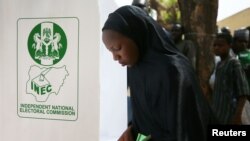Nigerian political observers are expressing concern over the many attacks on the facilities of Nigeria's electoral body - the Independent National Electoral Commission, or INEC. INEC officials say the commission has recorded at least 42 attacks on its facilities since the last polls in 2019.
Nine attacks occurred in 2019 and 21 others took place last year. But in the last four weeks, 12 more offices of the commission have either been set ablaze or vandalized.
The latest incident occurred Sunday in southeastern Imo state. Ballot boxes, voting cubicles, power generators and utility vehicles were destroyed.
Election officials are evaluating the extent of the damage but say an initial assessment shows it could significantly affect their ability to conduct credible elections in the affected places.
Political analysts like Jibrin Ibrahim, a senior fellow at the Center for Democracy and Development, agree that attacks on facilities coupled with Nigeria's general security challenges and separatist calls in two areas will affect polls.
"When some people are saying, 'We want out of the nation,' others are saying let's just vote and keep the nation, it becomes a difficult context to ensure that there's a level playing ground for election," Ibrahim said.
Officials blame unidentified armed groups and the separatist group Indigenous People of Biafra, or IPOB, for the latest attacks. IPOB advocates for an independent state in a part of Nigeria that tried to break away more than 50 years ago.
The government has not commented on the attacks.
In recent months, Nigeria has seen an escalation in violence by armed criminal groups, as well as the rising profile of IPOB and another separatist movement in southwestern Nigeria.
But political analyst and co-founder Youth Hub Africa Rotimi Olawale says insecurities can only delay elections but not hinder them.
"I am assured that the 2023 general elections will hold as scheduled. In 2019, the election was moved for a couple of weeks to allow for better management of the security architecture in the northeastern part of Nigeria. At the very worst-case scenario, I suspect that the elections in 2023 might also be moved for a few weeks," Olawale said.
Last week, INEC chief Mahmood Yakubu declared attacks on election offices a national emergency and met with top security chiefs to address the problem.
At a meeting Thursday, Nigerian security units pledged to support the commission by beefing up security around election offices.
However, expert Ezenwa Nwagwu says the attacks are politically driven and will likely escalate before the next polls.
"The Nigerian political elite [is] not innovative. They have not found any other means of negotiating for power except violence. You're going to see that towards next year, there will be the escalation of this violence," Nwagwu said.
INEC is approaching a major gubernatorial election, set for this November. Next month, the commission will begin a voter registration process for Nigeria's general polls in 2023.
Experts say the security situation will determine both turnout and the credibility of the process.
Attacks on Election Offices in Nigeria Raise Concerns




